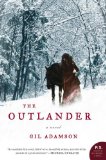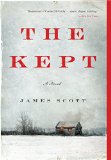Summary | Excerpt | Reading Guide | Reviews | Beyond the book | Read-Alikes | Genres & Themes | Author Bio

In 1903 a mysterious young woman flees alone across the West, one heart-pounding step ahead of the law. At nineteen, Mary Boulton has just become a widow—and her husband's killer. As bloodhounds track her frantic race toward the mountains, she is tormented by mad visions and by the knowledge that her two ruthless brothers-in-law are in pursuit, determined to avenge their younger brother's death. Responding to little more than the primitive fight for life, the widow retreats ever deeper into the wilderness—and into the wilds of her own mind—encountering an unforgettable cast of eccentrics along the way.
With the stunning prose and captivating mood of great works like Charles Frazier's Cold Mountain or early Cormac McCarthy, Gil Adamson's intoxicating debut novel weds a brilliant literary style to the gripping tale of one woman's desperate escape.
Mary Boulton's intense psychological transformation is augmented by Adamson's crystalline prose. Nothing is too minuscule for Adamson's notice: the mud at the bottom edge of Mary's hem, the glint in the brothers-in-laws' animal-like eyes, the color of the sky, the smell of the trees. Each sentence and paragraph is worth the contemplation of any great poem. The pacing is deliberate and perfect. Adamson's dark, yet delicate descriptions take this story from mere western escape story to a gothic fairytale. Mary's deepening madness, complete with hallucinated ghosts, plus the spare elements of romance, add to this perception...continued
Full Review
(471 words)
This review is available to non-members for a limited time. For full access,
become a member today.
(Reviewed by Sarah Sacha Dollacker).
Most of The Outlander is fictional, but the slide at Frank, which
catastrophically plagues the closing third of the story, is based on the factual
landslide at Frank, Alberta in 1903.
Frank, Alberta was a small Canadian mining outpost that was inaugurated as a
town in 1901. On April 29, 1903, 74 million tons of limestone
slid from the top
of Turtle Mountain and blanketed nearly three-square kilometers of the
valley floor. The slide removed the entire top of Turtle Mountain, dammed the
Crowsnest River, which formed a lake, blocked the Canadian Pacific Railway,
buried seven houses and other buildings near Frank, obliterated the majority of
the mine's exterior infrastructure, and killed 70 people. Although some believed
...
This "beyond the book" feature is available to non-members for a limited time. Join today for full access.

If you liked The Outlander, try these:

by Paulette Jiles
Published 2024
Consumed with grief, driven by vengeance, a man undertakes an unrelenting odyssey across the lawless post–Civil War frontier seeking redemption in this fearless novel from the award-winning and New York Times bestselling author of News of the World.

by James Scott
Published 2015
A scorching portrait of guilt and lost innocence, atonement and retribution, resilience and sacrifice, pregnant obsession and primal adolescence, The Kept is told with deep compassion and startling originality, and introduces James Scott as a major new literary voice.
A classic is a book that has never finished saying what it has to say
Click Here to find out who said this, as well as discovering other famous literary quotes!